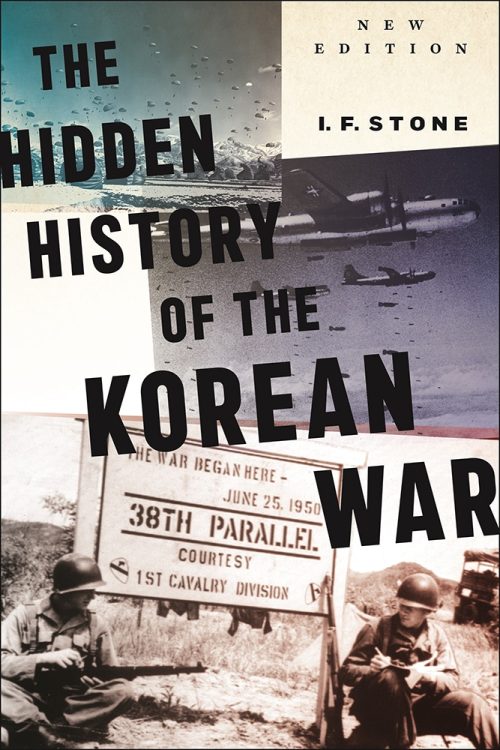The Hidden History of the Korean War: New Edition
By I.F. Stone, with a new introduction by Tim Beal & Gregory Elich
28$ /pp. 407 / 978-68590-00008-3
Reviewed by James Hoare for Asian Affairs
I.F. Stone (1907–1989) was a prominent and prolific American journalist, of Russian origin, whose I. F. Stone’s Weekly, later Biweekly, appeared between 1953 and 1971. His was once a powerful voice on the left wing of United States’ politics. A six-volume anthology of Stone’s writings, A Nonconformist History of Our Times appeared in 1989. This included A Hidden History of the Korean War, first published in 1952 and just reissued. A Hidden History was not well received in the United States on its original publication. Its criticisms of Commander-in-Chief General Douglas MacArthur, President Harry Truman and his advisor John Foster Dulles were seen as almost treasonable at a time when the United States was fighting a war for “freedom” in Korea. The press ignored it. Outside the US, it received a more favourable reception. This, perhaps, explains claims that the Spanish edition virtually disappeared in South America because US embassies bought up all the copies they could and destroyed them.
Stone proved that by meticulous reading of publicly available combat reports, press statements and other open sources, the more bombastic claims of leaders such as General MacArthur could often be discounted. He also chronicled the determination of MacArthur and Dulles to turn the Korean conflict into a much wider crusade against “international communism”. MacArthur was theoretically answerable both to the President and the Joint Chiefs of Staff in Washington, and also to the United Nations. The UN had established a “Unified Command” – then and now often mistakenly called the “United Nations Command” – to take control of the UN forces that had come to the aid of the Republic of Korea (ROK-South Korea) on the outbreak of war in June 1950. MacArthur, however, behaved in a manner quite independent of both his theoretical superiors in Washington and the UN. At the outbreak of the war, UN resolutions referred to restoring the pre-25 June 1950 status quo, a goal achieved in September with the pushing back of North Korean forces to the 38th parallel. But MacArthur ordered UN and ROK forces to carry the war into the north. While he received reports that clearly indicated that the newly established People’s Republic of China would not stand idly by if foreign troops approached their long border with Korea, MacArthur chose to ignore them. Indeed, he welcomed the idea of a conflict with China, and even with the Soviet Union, as part of his wider crusade against communism. An attack on the Soviet airbase of Sukhaya Rechka in October 1950 proved a step too far for the Truman administration, which feared a nuclear conflict with the Soviet Union. Stone argued that MacArthur had authorised it.
There was a hasty apology and the US offered compensation. In Stone’s account, this incident, which followed MacArthur’s demands that he be allowed to use nuclear bombs against North Korean and Chinese targets and that Chiang Kai-shek’s Chinese Nationalist forces should join his anti-communist crusade, was the final straw for President Truman, who insisted on a meeting with the general. MacArthur did not (perhaps would not) go to Washington, which he had not visited since the late 1930s. Instead, the two men met – for the only time – at Wake Island in the Pacific a month after the Soviet bombing incident. What happened there is not known – they met in private, and no record was kept. But Stone saw this as the beginning of the process that would lead to MacArthur’s dismissal from all his commands in April 1951. The general’s hope of a major anti-communist crusade was just too dangerous.
By then, the Korean War was in stalemate, more or less where it had started, a situation comparable to the Western Front in the First World War but went on for two further years under MacArthur’s successor, General Matthew Ridgeway. Stone, as always working from open-source materials, condemned the continuation of the bombing of the north even though there were no viable military targets left. These days, the Stone’s Hidden History , while still viewed with hostility in certain quarters, is regarded as one of his best works. But given that it appeared long before the archives were open and while the conflict in Korea continued, is there merit in republishing it? The answer is yes. Stone may not have got everything right, and occasionally lapses into conspiracy theories, but his broad picture was accurate enough at the time and remains so. It is a lasting tribute to meticulous journalism.

Comments are closed.